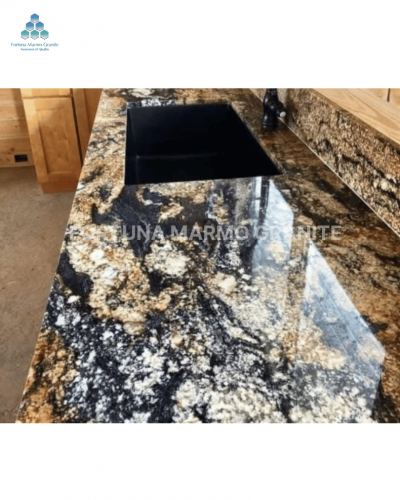"Top Outdoor Countertop Materials for Your Kitchen"
Top Outdoor Countertop Materials As outdoor living continues to gain popularity, many homeowners are focusing on building functional and stylish outdoor kitchens. These spaces are more than just a spot for grilling—they're designed for gathering, cooking, and enjoying fresh air with friends and family. Countertops play a key role in shaping both the look and utility of an outdoor kitchen. From meal prep to serving drinks and entertaining guests, they serve as the main hub of activity. Choosing the right material requires considering durability, weather resistance, and overall aesthetics. This guide highlights some of the best outdoor countertop materials to help you choose the perfect option for your outdoor cooking area.
1. Granite: Classic and Durable
Granite has long been a favorite material for kitchen designs, and its strength makes it just as suitable for outdoor countertops. With its rich colors and unique patterns, this natural stone adds timeless beauty to any space. It resists scratches, heat, and stains, ensuring reliable performance even in outdoor environments exposed to sun, rain, and temperature changes. Thanks to its solid composition, granite easily handles extreme weather conditions without losing its charm or durability. Though exceptionally strong, it still needs occasional sealing to preserve its protection against stains and moisture. This maintenance requirement is a consideration, especially for outdoor spaces where the countertop will be subject to rain, humidity, and other environmental factors. Still, for those who appreciate its timeless beauty and durability, granite is a solid investment for outdoor kitchens.
Pros of Granite:
- Durable and heat-resistant
- Wide range of colors and patterns
Cons of Granite:
- Requires periodic sealing
- Heavy and may require additional support
2. Quartz: Low Maintenance and Versatile
For homeowners looking for a low-maintenance option that still provides the elegance and durability of natural stone, quartz countertops are a great choice. Quartz countertops are engineered from a combination of crushed quartz stone, resin, and polymers, making them non-porous and highly resistant to stains, moisture, and bacteria. Unlike granite, quartz does not require sealing, making it a more hassle-free option for outdoor kitchens.
While quartz countertops come in a wide variety of colors and patterns, their look is generally more uniform compared to granite. Quartz's resistance to fading and discoloration from UV exposure makes it an excellent option for outdoor spaces that receive a lot of sunlight. Additionally, quartz is incredibly durable, providing a long-lasting surface for cooking and entertaining.
However, one thing to keep in mind is that quartz countertops are not as heat-resistant as granite. So, while they are perfect for most outdoor kitchen activities, placing hot pots or pans directly on the surface may cause damage.
Pros of Quartz:
- Low maintenance (no sealing required)
- Resistant to stains, moisture, and bacteria
Cons of Quartz:
- Not as heat-resistant as granite
- Can be prone to scratching in some cases
3. Concrete: Customizable and Robust
Concrete countertops are an increasingly popular choice for outdoor kitchens due to their versatility and customizability. Concrete can be molded into virtually any shape, allowing for a truly unique and personalized look. With the ability to add different pigments, textures, and finishes, concrete can be tailored to suit any style, from rustic to modern.
Concrete countertops are durable and resistant to many outdoor elements, but like granite, they require regular sealing to prevent staining, moisture penetration, and cracking. Concrete is also prone to chipping and cracking over time, especially if it's exposed to extreme temperature changes. However, with proper care and maintenance, concrete countertops can last for many years and provide a truly one-of-a-kind look.
Pros of Concrete:
- Highly customizable in terms of shape, color, and texture
- Durable and robust
- Can be paired with other materials for added flair
Cons of Concrete:
- Requires periodic sealing
- Prone to cracking or chipping over time
- Heavy and requires additional support
4. Stainless Steel: Sleek and Modern
Stainless steel countertops are a popular choice for outdoor kitchens, particularly for homeowners seeking a modern, sleek look. Stainless steel is incredibly durable, resistant to heat, stains, and bacteria, making it perfect for cooking spaces where hygiene is essential. It's also easy to clean, as spills can be wiped away quickly, and its non-porous surface doesn't absorb moisture or bacteria.
Stainless steel also offers a high level of resistance to UV rays, meaning it won't fade or discolor over time, even in direct sunlight. However, one downside of stainless steel is that it can scratch easily, and its shiny surface may show fingerprints or water spots. Despite this, its modern, industrial appearance makes it a popular option for contemporary outdoor kitchens.
Pros of Stainless Steel:
- Highly durable and heat-resistant
- Easy to clean and maintain
- Resistant to bacteria and staining
Cons of Stainless Steel:
- Prone to scratching
- Can show fingerprints and water spots
- May dent or bend under heavy impact
5. Soapstone: A Timeless, Elegant Option
Soapstone countertops have been used for centuries due to their durability and timeless appearance. While they are less common in outdoor kitchens, soapstone is an excellent choice for homeowners looking for a natural material that can stand up to the elements. Soapstone is highly resistant to heat, stains, and bacteria, and unlike granite, it does not require sealing. Over time, soapstone develops a natural patina, adding character and depth to the surface.
One of the major benefits of soapstone is that it is relatively low-maintenance compared to other natural stones. However, it can be prone to scratching and may need occasional care to keep its surface smooth. Despite this, soapstone's elegance and natural beauty make it a great option for outdoor kitchens that aim for a classic, sophisticated look.
Pros of Soapstone:
- Heat-resistant and durable
- Naturally resists bacteria and stains
- Develops a beautiful patina over time
Cons of Soapstone:
- Prone to scratching
- Can be more expensive than other materials
- May require occasional oiling to maintain appearance


